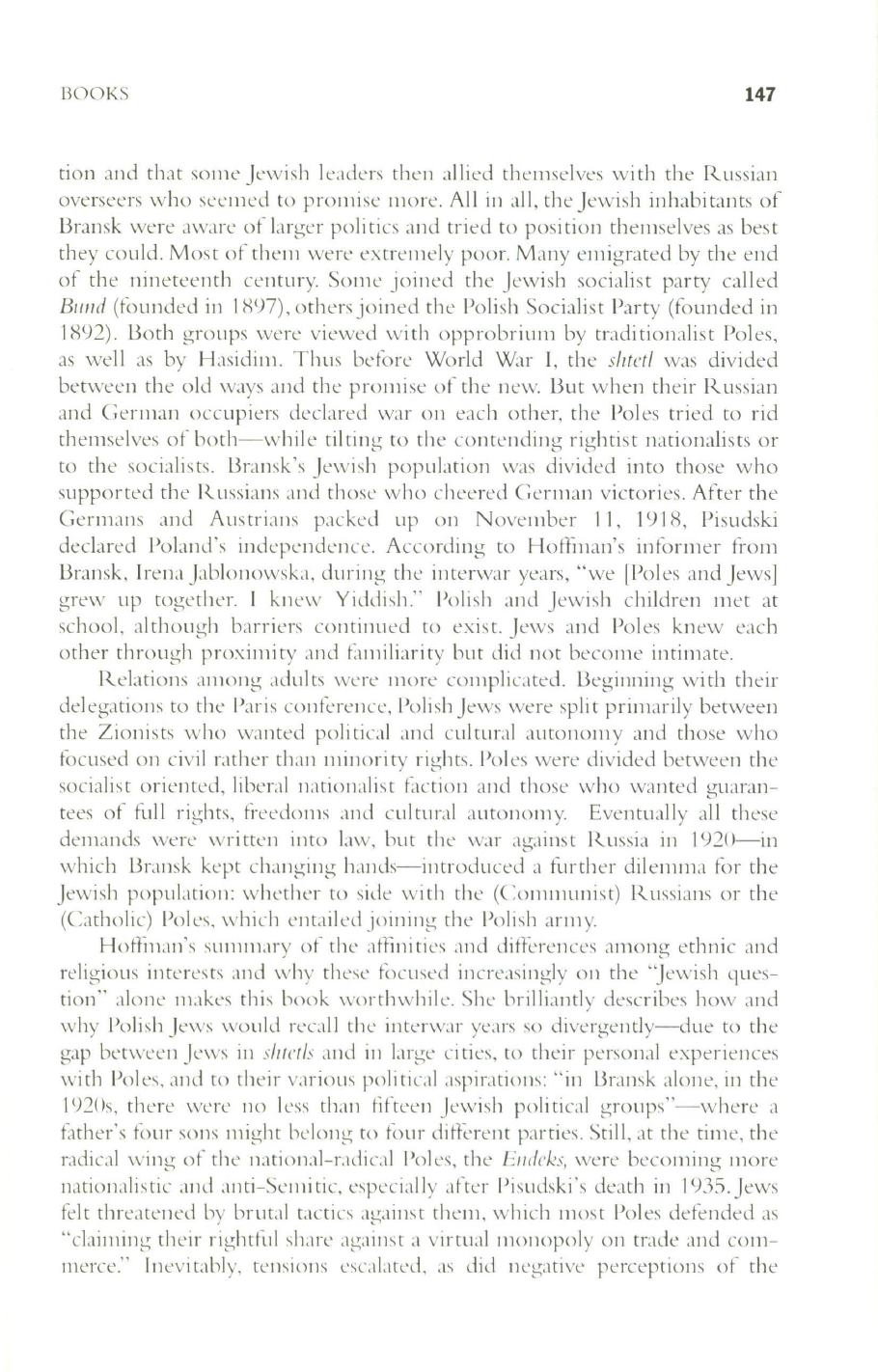
l300KS
147
tion and that SO ll1 e jewish Ieadns thl'n allied themselves with the Russian
oversel'rs who sCl'l 11 ed to prol1lisl' 11I0re. All in all, the jewish inhabitants of
13ransk were aW,lre of largn poli tics and tried to posi tion themselves as best
they cou ld. Most of tht'm werl' ntrl'lnl.'iy poor. Many emigrated by thl' end
of the ninetl'l'nth century. SomL' joined the jl'wish socialist party called
BIII/{!
(founded in I
WJ7),
others joined thl' Polish SocialIst Party (founded in
1
~92).
130th groups were viewed wi th opprobrium by tradi tionalist Poles,
as well as by Hasidim. Thus bl't()JT World War
I,
the
sizlell
was divided
between the old ways and the promisl' of the nl'\v' 13ut when their Russian
and Cerman occupiers declared war on each other, the Poles tried to rid
themselves of both-while tilting to the contl'nding rightist nationalists or
to the socialists. 13ransk's jl'wish population was divided into those who
supportl'd the
n ..
ussi 'lIls and those who cheerl'd Cerman victories. After the
Germans and Austrians packl'd up on November I I,
191~ ,
Pisudski
declared Poland's indepl'ndl'ncc. According to Hoftillan's informer from
13ransk, Ircna jablonowsb, during the interwar yea rs, "we [poles and jewsJ
grew up togethcr. I knew Yiddish." Polish and jewish children met at
school, although barrins continued to exist. jl'WS and Poles knew l'ach
other through proximi ty and fll11iliari ty but did not bl'come intimate.
Relations among adults werl' morl' complIcated. 13eginning with their
delegations to the Paris (()JlftTl'nce, Polish jews were split primarily between
the Zionists who wanted political and cultural autonomy and those who
focused on civil rather than minori ty rights. Poles were divided between the
socialist oriented, libeLd nationalist t:lction and those who wanted guaran–
tees of full rights, tiTedoms and cultur,ll autonomy. Eventually al l these
demands were written imo law, but the war against Russia in 192()-in
which 13ransk kept ch;lI1ging hands- imroduced a tLlrther dilemma for the
jewish population: whl'thl'r to side WI th the (Communist) Russians or the
(Ca tholic) Poles, which l'ntailed joining the Polish army.
Hoftinan's sunlilury of the afflnitil's and dittl-rences among ethnic and
religious interests and why thesl' f(.lCusl'd increasingly on the "jewish ques–
tion" alone m.lkes thi s book worthwhile. SIlt' brilliantly describes how and
why Polish jews wou ld reelll the interwar ye;lrs so divergently- due to the
gap between jews in
sizlell..'
and in large ci ties, to their personal experiences
with Poles. and to th eir various political aspirations: "in 13ransk alone, in the
192()s, thl're WlTl' no less than tiftl'en jl'wish poli tical groups"-where a
t:lther's f(wr sons l11i ght belong
to
t()ur ditt"lTent parties. Still, at thl' time, the
radical wing of the national-r,ldi c d Poles, the
tllciek..',
were becoming more
nationalistic ;lI1el ami-Semi tic, especi;llly after Pisudski's death in 1935. jews
felt threatened by brutal tactics against them, which most Poles defended as
"claiming their rightfi.i1 share against a virtual monopoly on trade and com–
Illerce." Inevi ubly, tl'nsions esc.datl'd,
.IS
did ncgatiw perceptions or the


